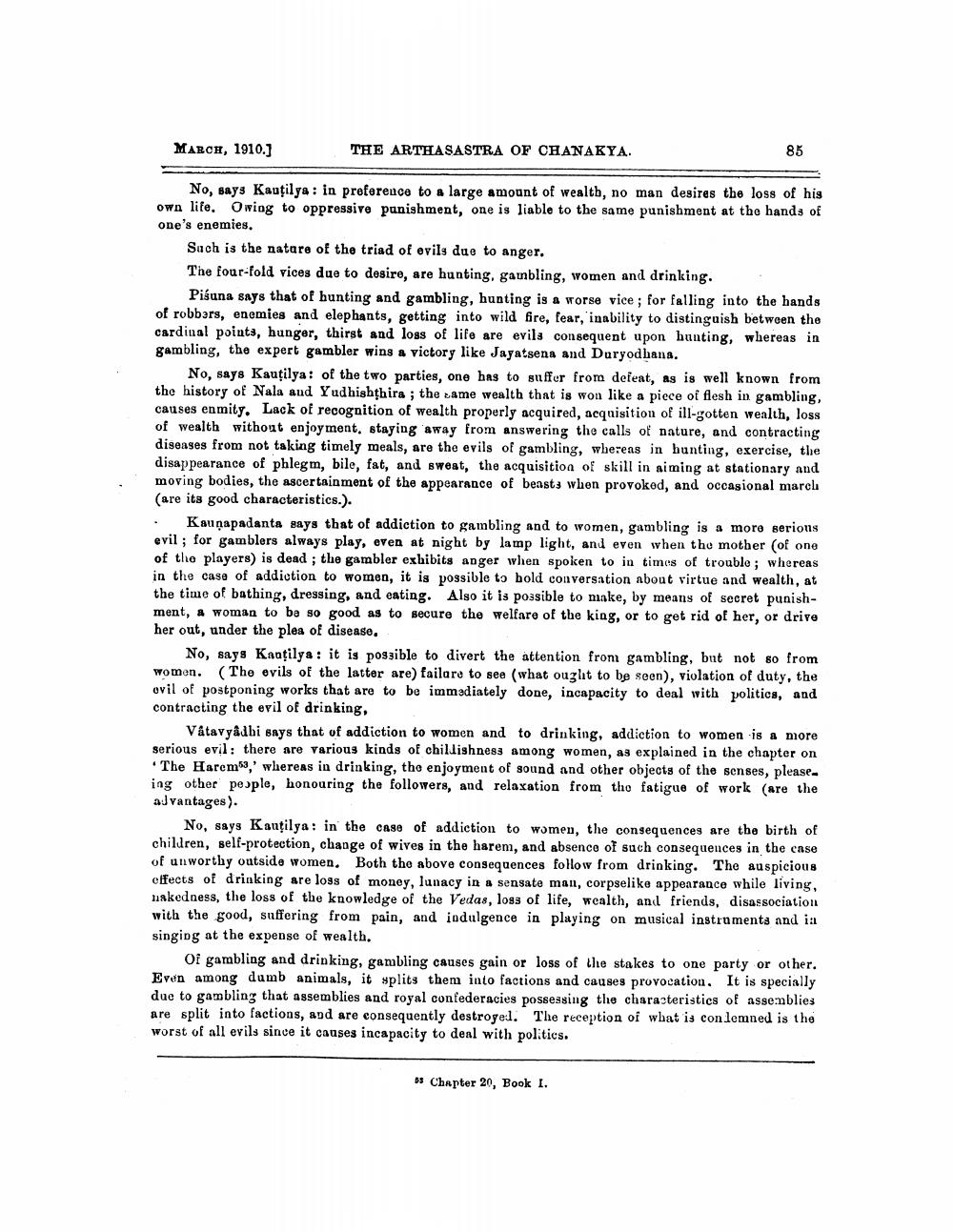________________
MARCH, 1910.]
THE ARTHASASTRA OF CHANAKYA.
No, says Kautilya: in preference to a large amount of wealth, no man desires the loss of his own life. Owing to oppressive punishment, one is liable to the same punishment at the hands of one's enemies.
85
Such is the nature of the triad of evils due to anger.
The four-fold vices due to desire, are hunting, gambling, women and drinking.
Pisuna says that of hunting and gambling, hunting is a worse vice; for falling into the hands of robbers, enemies and elephants, getting into wild fire, fear, inability to distinguish between the cardinal points, hunger, thirst and loss of life are evils consequent upon hunting, whereas in gambling, the expert gambler wins a victory like Jayatsena and Duryodhana.
No, says Kautilya: of the two parties, one has to suffer from defeat, as is well known from the history of Nala and Yudhishthira; the same wealth that is won like a piece of flesh in gambling, causes enmity. Lack of recognition of wealth properly acquired, acquisition of ill-gotten wealth, loss of wealth without enjoyment, staying away from answering the calls of nature, and contracting diseases from not taking timely meals, are the evils of gambling, whereas in hunting, exercise, the disappearance of phlegm, bile, fat, and sweat, the acquisition of skill in aiming at stationary and moving bodies, the ascertainment of the appearance of beasts when provoked, and occasional march (are its good characteristics.).
Kaunapadanta says that of addiction to gambling and to women, gambling is a more serious evil; for gamblers always play, even at night by lamp light, and even when the mother (of one of the players) is dead; the gambler exhibits anger when spoken to in times of trouble; whereas in the case of addiction to women, it is possible to hold conversation about virtue and wealth, at the time of bathing, dressing, and eating. Also it is possible to make, by means of secret punishment, a woman to be so good as to secure the welfare of the king, or to get rid of her, or drive her out, under the plea of disease.
No, says Kautilya: it is possible to divert the attention from gambling, but not so from women. (The evils of the latter are) failure to see (what ought to be seen), violation of duty, the evil of postponing works that are to be immediately done, incapacity to deal with politics, and contracting the evil of drinking,
Vâtavyadhi says that of addiction to women and to drinking, addiction to women is a more serious evil: there are various kinds of childishness among women, as explained in the chapter on The Harem53,' whereas in drinking, the enjoyment of sound and other objects of the senses, please. ing other people, honouring the followers, and relaxation from the fatigue of work (are the advantages).
No, says Kautilya: in the case of addiction to women, the consequences are the birth of children, self-protection, change of wives in the harem, and absence of such consequences in the case of unworthy outside women. Both the above consequences follow from drinking. The auspicious effects of drinking are loss of money, lunacy in a sensate man, corpselike appearance while living, nakedness, the loss of the knowledge of the Vedas, loss of life, wealth, and friends, disassociation with the good, suffering from pain, and indulgence in playing on musical instruments and in singing at the expense of wealth.
Of gambling and drinking, gambling causes gain or loss of the stakes to one party or other. Even among dumb animals, it splits them into factions and causes provocation. It is specially due to gambling that assemblies and royal confederacies possessing the characteristics of assemblies are split into factions, and are consequently destroyed. The reception of what is con lemned is the worst of all evils since it causes incapacity to deal with politics.
55 Chapter 20, Book I.




